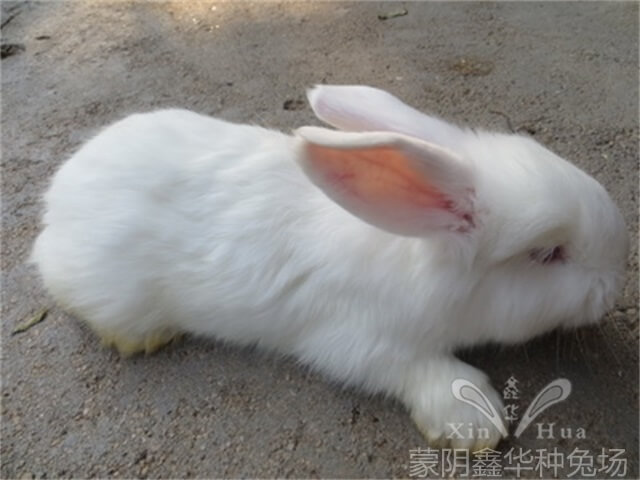養(yǎng)長毛兔需要做哪些管理?
 發(fā)布日期:2021-07-30
來源:http://www.lyhggs.com 發(fā)布人:admin
發(fā)布日期:2021-07-30
來源:http://www.lyhggs.com 發(fā)布人:admin
1、籠舍建設(shè)長毛兔一般采用籠養(yǎng),種兔單籠分養(yǎng),幼兔一籠多養(yǎng)。常用的兔籠一般長60厘米、寬55厘米、高45厘米;3層,兔籠底部離地30厘米以上。籠底板更好鋪設(shè)竹片。
1. In the construction of cages, long haired rabbits are generally raised in cages. Breeding rabbits are raised separately in a single cage, and young rabbits are raised in more than one cage. Commonly used rabbit cages are generally 60 cm long, 55 cm wide and 45 cm high; On the 3rd floor, the bottom of the rabbit cage is more than 30cm above the ground. It is best to lay bamboo pieces on the bottom plate of the cage.
2、飼養(yǎng)管理長毛兔飼料選擇上,應(yīng)根據(jù)其飲食偏好選取青草、胡蘿卜、谷芽、麥芽等,配合少量食用糖、植物油等增加飼料的適口性。長毛兔每日飼喂3-4次,要定時(shí)定量飼喂,尤其夜間要保證有充足的草料和飲水。
2. In the feed selection of long haired rabbits, grass, carrots, millet sprouts and malt should be selected according to their dietary preferences, combined with a small amount of edible sugar and vegetable oil to increase the palatability of the feed. Long haired rabbits are fed 3-4 times a day. They should be fed regularly and quantitatively, especially at night.
3、衛(wèi)生管理兔舍門前池要保證常年有藥液。堅(jiān)持定期給兔舍徹底,冬季每30天1次,春秋季節(jié)每15天1次,夏季每10天1次,控制好液的濃度,可實(shí)行帶兔。每天要搞好兔舍衛(wèi)生,及時(shí)殘?jiān)图S尿。
3. The disinfection pool in front of the rabbit house shall be provided with disinfectant throughout the year. Adhere to the regular thorough disinfection of the rabbit house. Disinfect once every 30 days in winter, once every 15 days in spring and autumn, and once every 10 days in summer. Control the concentration of disinfectant and disinfect with rabbits. The rabbit house shall be cleaned every day, and the residue and feces and urine shall be removed in time.

4、適時(shí)采毛長毛兔出生3個(gè)月后即可采毛。收購?fù)妹前撮L度分級(jí)定價(jià)的,為確保兔毛質(zhì)量,更好每10天用梳子將兔毛梳理一次,以防纏結(jié)。采好后,分級(jí)包裝,分級(jí)存放,以提高銷售等級(jí)。
4. Timely hair picking long haired rabbits can pick hair 3 months after birth. The national purchase of rabbit hair is priced according to the length. In order to ensure the quality of rabbit hair, it is best to comb the rabbit hair with a comb every 10 days to prevent entanglement. After picking, it shall be packed and stored by levels to improve the sales level.
年齡關(guān):選擇60日齡以上、體重達(dá)2公斤以上的青年兔作種兔。年齡體重過小的兔,抗病力弱,適應(yīng)性差,難以適應(yīng)長途運(yùn)輸和飼養(yǎng)管理變化,不宜引入。 健康關(guān):選擇*兔時(shí),應(yīng)仔細(xì)檢查*兔的健康狀況。要求*兔眼睛干凈,呼吸無聲。公*兔無陰部炎癥,糞便呈球狀,食欲正常,被毛光亮不雜亂。 運(yùn)輸關(guān):利用專用運(yùn)輸籠裝運(yùn)。炎熱夏天不宜在中午運(yùn)輸,以免*兔中暑,更好在早晨和晚上運(yùn)輸。運(yùn)輸途中要細(xì)心護(hù)理*兔,常觀察*兔的活動(dòng)情況。特別注意的是*兔*性很大,一旦裝進(jìn)籠里,會(huì)相互碰撞,要防止相互踏傷或踩死
Age: select young * rabbits over 60 days old and weighing more than 2kg as breeding rabbits. * rabbits with too small age and weight have weak disease resistance and poor adaptability, which are difficult to adapt to long-distance transportation and feeding management changes, and should not be introduced. Health level: when selecting * rabbits, carefully check the health status of * rabbits. It is required that * rabbit eyes are clean and breathing is silent. Male * rabbits have no pudendal inflammation, their feces are spherical, their appetite is normal, and their hair is bright and not messy. Transportation: use special transportation cage for transportation. In hot summer, it is not suitable to transport at noon to avoid heatstroke. It is best to transport in the morning and at night. Take care of * rabbits during transportation and often observe * rabbits' activities. Special attention is paid to that * rabbits * are very strong. Once they are installed in the cage, they will collide with each other. It is necessary to prevent mutual injury or death



 發(fā)布日期:2021-07-30
來源:http://www.lyhggs.com 發(fā)布人:admin
發(fā)布日期:2021-07-30
來源:http://www.lyhggs.com 發(fā)布人:admin